|
By accessing or using The Crittenden Automotive Library™/CarsAndRacingStuff.com, you signify your agreement with the Terms of Use on our Legal Information page. Our Privacy Policy is also available there. |

Russia Has the Wheels; Now it Needs the Roads
|
|---|
|
|
Russia Has the Wheels; Now it Needs the Roads
James Brooke
Voice of America
April 10, 2012
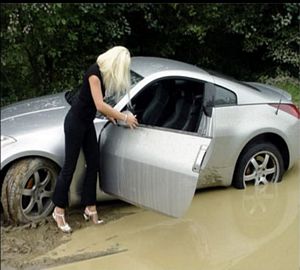 Russians get perverse pleasure out of taking photos of their bad roads and then posting the pictures on the internet. Russians get perverse pleasure out of taking photos of their bad roads and then posting the pictures on the internet.
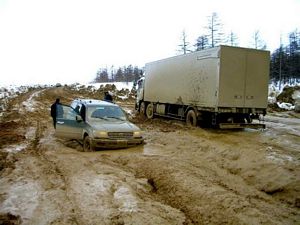 April is the mud season in Siberia! April is the mud season in Siberia!
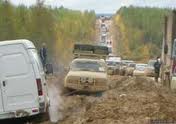 I wonder where the budget money for the asphalt went? The Lena 'Highway' in Siberia. I wonder where the budget money for the asphalt went? The Lena 'Highway' in Siberia.
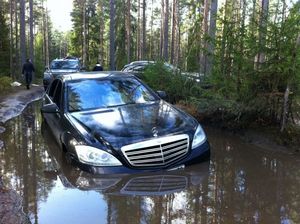 Some Russian drivers don't realize how deep their puddles can be. Photo: English Russia website. Some Russian drivers don't realize how deep their puddles can be. Photo: English Russia website.
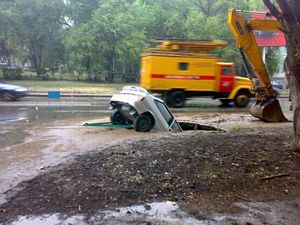 And, yes, city potholes can be big too. And, yes, city potholes can be big too.
|
This year, for the first time, Russia is expected to top Germany as Europe’s largest car market.
With car purchases increasing by 20 percent in Russia this year, the Center of Automotive Management predicts that Russians will buy 3.2 million vehicles during 2012, slightly more than Germany.
So how are Russia’s roads?
According to the World Economic Forum’s Global Competitiveness Report, Russia ranks number 125 out of 139 countries on the quality of its highway infrastructure. According to another report, this one by Renaissance Asset Management, barely half of Russia’s road networks meet minimum riding quality and strength measurements.
All this leads to a highway fatality rate in Russia that is higher than in Brazil, China and India.
But I don’t need reports to tell me this the morning after I made a hair raising 250 kilometer drive from Moscow to Yaroslavl. And then back again.
In a 20-kilometer bypass of the M8, the drivers of 18-wheel trucks zig-zagged around huge potholes eased their rigs slooowly over deepening trenches gouged in crumbling asphalt, or tried their luck in the spring chocolate sauce of deep mud that bounded that two lane “highway.” All the while, drivers of private cars wrestled to find their space in this obstacle course.
I felt a pang of nostalgia. I felt I was back in Brazil in the 1970s, trying to move along the fringe of Amazon rainforest.
But this was “European Russia” and my destination was Yaroslavl, an ancient city founded in 1010. Yaroslavl was built on the west bank of the Volga River, Russia’s main thoroughfare for trade for centuries.
After 1,000 years, the Russian state still has not learned how to build safe and solid roads.
Judge a nation’s economy by its car fleet.
Judge its government by its roads.
Roads reflect a government’s ability to project power and to harness bureaucracy for the common good.
In my life’s travels, I have had the luck – and pleasure — of walking the Appian Way, built near Rome around 300 BC. In Peru’s Andes, I hiked the Inca Trail, built as a stone path from the Andes to the Pacific in the 1450s. In Angola, I have seen traces of asphalt roads swallowed up by the African bush after the collapse of Portuguese colonialism in 1975.
In Russia today, the “highway” between Moscow and St. Petersburg is such a death trap that I spent $1,200 on train tickets last December for myself and my three sons. Driving to St. Petersburg and back would have seriously risked cutting one branch from the Brooke family tree.
While China builds an interstate highway system that connects cities you have never heard of, Russia still cannot link its two largest cities with a safe, eight-lane divided highway.
The traditional Russian response is to quote Nikolai Gogol. This satirist once wrote that Russia’s two problems are – duraki i dorogi – fools and roads. But Gogol wrote that almost two centuries ago.
In the 1980s, people used to have a similar throwaway line for Brazil: “Brazil, the country of the future – and it always will be.” Today, people who say that are either intellectually lazy or simply out of touch.
But Russia’s fools and roads comment came back to me Monday. One hour north of Moscow, I was dealing with the kind of mud tracks you might associate with rural Bolivia.
Stealing money on road construction is really easy.
You contract to lay 10 centimeters of asphalt. You put down five centimeters. You pocket the difference, minus the amount need to keep the state road inspector happy.
The current joke in Moscow is that so much money has been stolen on reconstructing the main highway in Sochi for the 2014 Winter Olympics that it would have been cheaper to pave the 20 kilometer section of the M27 with Louis Vuitton handbags.
Asked a few weeks ago about highway corruption, Russia’s Transport Ministry responded limply that there is no point in creating a black list of corrupt highway contractors.
Why?
Because the companies would just change their names.
Another governmental copout is that Russia has a bad climate.
Oh, really? I grew up in rural New England where road maintenance and snow plowing are points of pride. At the annual town meetings, one of the hottest topics is the road budget.
Across Canada, Russia’s sister nation on the far side of the North Pole, roads are excellent.
In Northern Japan, where I also worked, roads are scarily well maintained. In mountain areas, they actually heat some stretches of pavement to prevent ice. You feel like you should wash your tires and make a little bow before driving over these roads.
After the climate, apologists for Russia’s bad roads focus on the fool factor.
That’s odd. Look closely at a Google map of the Russian-Finnish border.
On the Finnish side, the road network looks pretty good.
On side of Russian Karelia, paved rural roads seem few and far between.
Finland and Karelia share pretty much the same genetic stock, the same hard drinking habits, and a lot of history. Until 1917, Finland was a Grand Duchy in the Czarist empire.
But modern Russia lacks the local citizen responsibility that you see in New England, Canada, Japan and Finland. Communism did a good job of wiping out Russian feelings of responsibility toward public property.
Russia’s new democracy movement seeks to build citizen responsibility for local affairs.
And then, on leadership side of the coin, it is clear that, despite the authoritarian longings, Vladimir Putin is no Inca. Although the title Czar derives from the word Caesar, the modern connection is not there. Generation hence, no one will pen odes to Putin’s roads.
With his carefully created TV image, Putin may be more like the Wizard of Oz.
Behind the tough guy act, Putin does not seem to really control Russia’s bureaucracy.
During the 2000s, annual spending on Russian roads doubled to $20 billion a year. But statistics show that Russia’s network of paved roads gradually retreated.


















